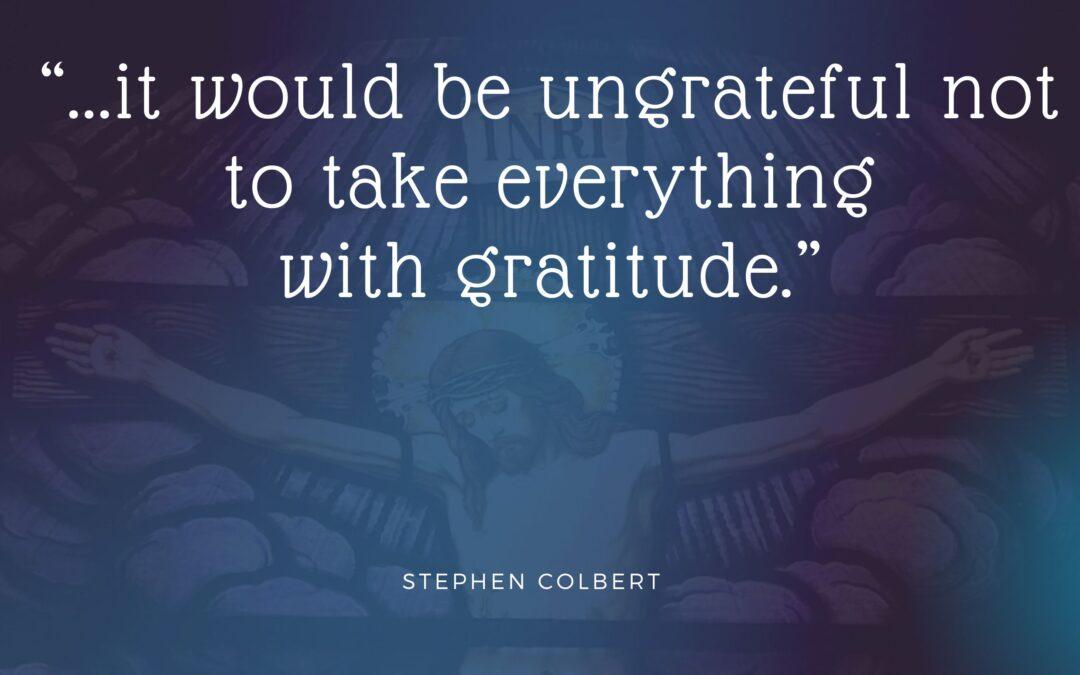Dear Friends,
Last Sunday we had a very successful Spaghetti Dinner thanks to the help of so many of you who offered your time and energy to make it happen. What people are most impressed with is the wonderful welcome and hospitality they receive from all of you – your care, your smiles, your eagerness to serve them. I talked to a number of people where this was their first visit to a spaghetti dinner, and they were sad that they had never attended before. They all said they would be back for the October dinner. So, my deepest thanks to all of you for being such great disciples of Jesus even in the simple tasks of serving spaghetti.
St. Paul teaches us to give thanks to God in all things. That attitude of gratitude matters so much in how we approach our world – not complaining to God and others but offering thanks to God for all that we have received. Back in 2015 I read an interview in GQ magazine about Stephen Colbert. A part of the interview touched me deeply where it explored how he found gratitude in the midst of suffering. When he was 10 years old, his father and two of his brothers were killed in a plane crash. Young Stephen was the only child still at home with his mother in the years immediately following. When asked how he could experience such losses and not become angry or bitter, his response was:
He lifted his arms as if to take in the office, the people working and laughing outside his door, the city and the sky, all of it. “And the world,” he said. “It’s so…lovely. I’m very grateful to be alive, even though I know a lot of dead people.” The urge to be grateful, he said, is not a function of his faith. It’s not “the Gospel tells us” and therefore we give thanks. It is what he has always felt: grateful to be alive. “And so that act, that impulse to be grateful, wants an object. That object I call God. Now, that could be many things. I was raised in a Catholic tradition. I’ll start there. That’s my context for my existence, is that I am here to know God, love God, serve God, that we might be happy with each other in this world and with Him in the next—the catechism. That makes a lot of sense to me. I got that from my mom. And my dad. And my siblings.”
He was tracing an arc on the table with his fingers and speaking with such deliberation and care. “I was left alone a lot after Dad and the boys died…. And it was just me and Mom for a long time,” he said. “And by her example I am not bitter. By her example. She was not. Broken, yes. Bitter, no.” Maybe, he said, she had to be that for him. He has said this before—that even in those days of unremitting grief, she drew on her faith that the only way to not be swallowed by sorrow, to in fact recognize that our sorrow is inseparable from our joy, is to always understand our suffering, ourselves, in the light of eternity. What is this in the light of eternity? Imagine being a parent so filled with your own pain, and yet still being able to pass that on to your son.
“It was a very healthy reciprocal acceptance of suffering,” he said. “Which does not mean being defeated by suffering. Acceptance is not defeat. Acceptance is just awareness.” He smiled in anticipation of the callback: “‘You gotta learn to love the bomb,’” he said. “Boy, did I have a bomb when I was 10. That was quite an explosion. And I learned to love it. So that’s why. Maybe, I don’t know. That might be why you don’t see me as someone angry and working out my demons onstage. It’s that I love the thing that I most wish had not happened.”
I asked him if he could help me understand that better, and he described a letter from Tolkien in response to a priest who had questioned whether Tolkien’s mythos was sufficiently doctrinaire, since it treated death not as a punishment for the sin of the fall but as a gift. “Tolkien says, in a letter back: ‘What punishments of God are not gifts?’” Colbert knocked his knuckles on the table. “‘What punishments of God are not gifts?’” he said again. His eyes were filled with tears. “So it would be ungrateful not to take everything with gratitude. It doesn’t mean you want it. I can hold both of those ideas in my head.”
He was 35, he said, before he could really feel the truth of that. He was walking down the street, and it “stopped me dead. I went, ‘Oh, I’m grateful. Oh, I feel terrible.’ I felt so guilty to be grateful. But I knew it was true.
Peace,
Fr. Damian



